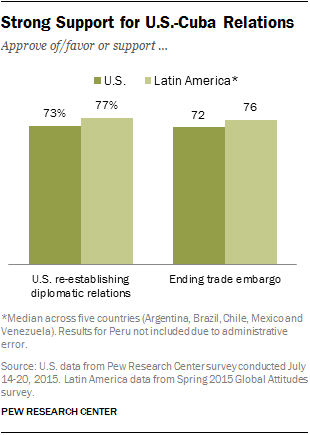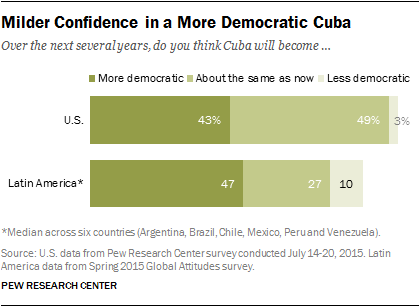The dueling bills are:
The Cuban U.S. Claims Settlement Act:
U.S. Senators Marco Rubio (R-FL) and David Vitter (R-LA) have introduced legislation that would require Cuba to address unsettled and unpaid legal claims with the U.S. before easing restrictions on travel and trade with Cuba.
Versus
The Cuba Digital and Telecommunications Advancement Act (DATA):
U.S. Senators Tom Udall (D-N.M.), Jeff Flake (R-Ariz.), Dick Durbin (D-Ill.) and Mike Enzi (R-Wyo.) have introduced bipartisan legislation that would enable U.S. telecommunications and Internet companies to provide their services and devices in Cuba.
And
On December 17, 2014, the Whitehouse published a fact sheet called Charting a New Course on Cuba saying that "Telecommunications providers will be allowed to establish the necessary mechanisms, including infrastructure, in Cuba to provide commercial telecommunications and Internet services, which will improve telecommunications between the United States and Cuba."
I am no politician, but here are a couple observations.
- DATA is a way better acronym than CUCSA
- The DATA act sounds redundant, but the next president or the courts could reverse President Obama's Cuba policy.
- The Helms-Burton act prohibits "the investment by any United States person in the domestic telecommunications network within Cuba."
- Cuba is rolling out infrastructure now -- US companies will miss the boat unless the DATA act passes or the embargo is dropped.
- I bet both acts sneak in more than their one-sentence summaries indicate.
- The DATA act is bi-partisan -- when is the last time that happened?
- Cuba also has claims against the U. S. for damage caused by the trade embargo.
-----
Update 6/3/2015
U.S. House panel seeks to ban funding for U.S. embassy in Cuba.
The appropriations bill released on Tuesday would restrict funds to facilitate the opening of a Cuban embassy in the United States, increase democracy assistance and international broadcasting to Cuba and provide direction to the State Department on denying visas to members of the Cuban military and Communist Party.
-----
Update 6/5/2015
The House of Representatives has passed a transportation funding bill that includes a provision to reverse the Obama administration's easing of restrictions on travel to Cuba -- travellers would again require a license from the Treasury Department as they had in the past.
The Republican rationale is that portions of the Havana airport were expropriated by Cuban government. The White House has threatened to veto the bill, in part because of the Cuba-related provision.
I don't know what all the transportation bill deals with, but it is surely a lot more than just this "poison pill" issue.
-----
Update 6/12/2015
U.S. Senators Jerry Moran (R-Kan.) and Angus King (I-Maine) have introduced legislation to restore trade with Cuba. The Cuba Trade Act of 2015 (S. 1543) would grant the private sector the freedom to export U.S. goods and services to Cuba while protecting U.S. taxpayers from any risk or exposure associated with such trade.
The senators seem to have different motivations for sponsoring the bill. Senator Moran is attracted to the bill by the possibility of exporting Kansas farm and ranch produce to Cuba and Senator King is worried about the growing influence of China in Cuba.
-----
Update 6/29/2015
Three more senators -- a Republican and two Democrats -- visit Cuba.
Three visiting U.S. senators said on Saturday they hoped Congress would support President Barack Obama's opening toward Cuba, including lifting a ban on U.S. citizens traveling to the Communist-run island.
Democratic Senators Patrick Leahy of Vermont and Ben Cardin of Maryland joined Republican Dean Heller of Nevada on a trip to Cuba where they met First Vice-President Miguel Diaz-Canel, Foreign Minister Bruno Rodriguez and ordinary Cubans.
-----
Update 7/20/2015
Rep. Kevin Cramer, R-N.D. and Rep. Peter Welch, D-Vt., on Monday announced they will introduce the Cuba DATA Act, a bill that would enable U.S. telecommunications and Internet firms to offer more services in Cuba. We now have versions of the Cuban DATA Act before both the House of Representatives and the Senate.
A bill with bi-partisan support is unusual, but this one is not surprising since 2/3 of the US public favors ending the embargo. (These bills stop short of repealing the embargo -- they seek to exempt a single industry).
Senate majority leader Mitch Mcconnel opposes President Obama's Cuban policy, but it seems the President has outflanked him on this issue.
-----
Update 7/24/2015
The Senate Appropriations Committee voted to allow Americans to travel to Cuba and to block enforcement of a law prohibiting banks and other U.S. businesses from financing sales of U.S. agricultural exports to Cuba. Four Republicans joined the 14 Committee Democrats in an 18-12 vote.
Democratic Senator Patrick Leahy said "This is a first step by the Senate to dismantle a failed, discredited and counterproductive policy that in 54 years has failed to achieve any of its objectives ... These votes were not about the repugnant policies of the Castro regime, but about doing away with unwarranted impediments to travel and commerce imposed on Americans by our own government."
-----
Update 8/3/2015
A New York Times editorial points out that there is Growing Momentum to Repeal Cuban Embargo:
A growing number of lawmakers from both parties have taken promising steps in that direction in recent weeks. Representatives Tom Emmer, Republican of Minnesota, and Kathy Castor, Democrat of Florida, introduced a bill in the House last week that would lift the embargo. Earlier last month, the Senate Appropriations Committee passed amendments that would allow American citizens to travel to Cuba freely and ease some commercial interactions.
A Pew Research Center poll released on July 21 showed that 72 percent of Americans support ending the embargo against Cuba, up from 66 percent in January.
-----
Update 8/12/2015
A new Pew poll shows US support for ending the Cuban embargo has climbed to 77% and 76% of the Latin Americans polled agree.

But, they are not certain that Cuba will become more democratic:

-----
Update 10/21/2015
Nine US governors have called for an end to the embargo -- and two of them are Republicans. This seems to be the only issue with any bi-partisan support in the US congress. I guess these folks are thinking about both doing business with Cuba and public opinion (see poll results above).
-----
Update 1/13/2016
President Obama called for an end to the Cuban trade embargo in his State of the Union address. The American public also favors ending the embargo and this is one of the few (only?) issues with some bi-partisan support, so it is conceivable that he will get his wish.



No comments:
Post a Comment